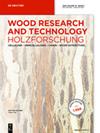用压力处理蓖麻油浸渍木材的抗腐性和尺寸稳定性
IF 1.6
3区 农林科学
Q2 FORESTRY
引用次数: 0
摘要
摘要本试验研究了蓖麻油(CAO)在某些木材样品中的吸收情况,以及CAO对木材样品浸出能力、尺寸稳定性和抗真菌腐性的影响。通过压力处理将CAO注入标本中。黄杨(yem)、杉木(JAC)和花旗松(DOF) 3个砧木对CAO的渗透吸收量均高于100%。cao基悬浮液对咸水的浸出能力在杨木中最低,其次是落叶松(LAR)、JAC和DOF。大多数标本的保留值为90%或更高。与对照标本相比,经cao处理的条带在盐水中浸泡2周后,径向和切向肿胀受到抑制。cao处理的带材抗弯强度和Janka硬度与对照无显著差异。CAO处理对大多数木材样品具有可接受的抗古拟虫和花斑曲菌的腐殖性。通过x射线显微镜观察,确定了CAO在浸出条带中的保留情况。结果表明,CAO是提高木材尺寸稳定性的有效剂。这些结果证明了CAO作为环保木材防腐剂和尺寸稳定剂的巨大潜力,允许CAO渗透木材作为室内和室外使用的原材料。本文章由计算机程序翻译,如有差异,请以英文原文为准。
Decay resistance and dimensional stability of wood impregnated with castor oil using a pressure treatment
Abstract This study was conducted to investigate the uptake of castor oil (CAO) in some wood specimens and the effect of CAO on the leaching ability, dimensional stability and fungal-decay resistance of the wood specimens. CAO was infused into the specimens using a pressure treatment. Uptakes of CAO penetrated in yellow poplar (YEP), Japanese cedar (JAC) and Douglas fir (DOF) blocks were higher than 100 %. The leaching ability of the CAO-based suspensions against saline water was the lowest in YEP, followed by Japanese larch (LAR), JAC and DOF. The retention values were 90 % or higher in most of the specimens. Radial and tangential swellings of CAO-treated strips submerged in saline water for 2 weeks were restrained compared to control specimens. No significant differences were found between bending strength and Janka hardness of CAO-treated and control strips. CAO treatment provided acceptable decay resistance to most wood specimens against Fomitopsis palustris and Trametes versicolor . Retention of CAO in the leached strips were identified through X-ray microscopic observation. Based on the results, CAO was determined to be an effective agent for improving the dimensional stability of wood. These results demonstrate the great potential of CAO as an environmentally friendly wood preservative and dimensional stabilizer, allowing CAO-permeated wood as raw materials for both indoor and outdoor use.
求助全文
通过发布文献求助,成功后即可免费获取论文全文。
去求助
来源期刊

Holzforschung
工程技术-材料科学:纸与木材
CiteScore
4.60
自引率
4.20%
发文量
83
审稿时长
3.3 months
期刊介绍:
Holzforschung is an international scholarly journal that publishes cutting-edge research on the biology, chemistry, physics and technology of wood and wood components. High quality papers about biotechnology and tree genetics are also welcome. Rated year after year as one of the top scientific journals in the category of Pulp and Paper (ISI Journal Citation Index), Holzforschung represents innovative, high quality basic and applied research. The German title reflects the journal''s origins in a long scientific tradition, but all articles are published in English to stimulate and promote cooperation between experts all over the world. Ahead-of-print publishing ensures fastest possible knowledge transfer.
 求助内容:
求助内容: 应助结果提醒方式:
应助结果提醒方式:


